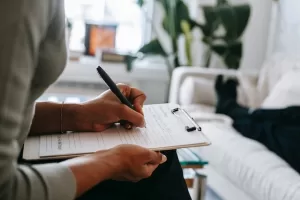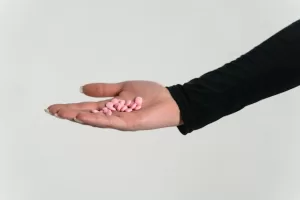Mental health is a very hot topic nowadays. It’s always been so, but now more than ever. In my opinion, that has a lot to do with social media.
Because of social media, we spend more and more time “somewhere else”.
When we spend time on social media, our mind wanders from place to place.
According to Buddhism, peace of spirit comes from being present, “here and now”. Sadly, we are doing the opposite, trying to be anywhere but here.
It’s important to take care of our mental health and those around us because sometimes we don’t realize something is off until it’s too late.
I. What is mental health?
Mental health is how well you are inside, how balanced your mind and emotions are.
If you neglect your mental health, you’ll be more prone to mental disorders. Same as with physical diseases.
· Some statistics about mental health
- 1 in 4 people will be affected by mental disorders at some point in their lives
- anxiety disorders are the most common: 284 million people suffer some type of anxiety
- depression is next: 264 million people
- 800,000 people die by suicide every year
II. The importance of seeking help
Quite often, we can’t see when something is wrong with our own mental health. And so, we fail to seek help.
It’s much more obvious why you need to go to the doctor if there’s blood in your pee, for example. But mental health is trickier: what if you are having self-destructive thoughts? Or if you feel depressed?
First, we need to make a distinction. It’s okay to feel down from time to time. Humans are emotional beings and they sometimes feel happy while other times they feel down. The same way it’s not ok to always feel down, it wouldn’t be normal either to always feel ecstatic.
Feeling sad in that situation doesn’t mean you have a depression.
The problem comes when these states go on for too long, especially if they are not related to an adverse event.
For example, when you feel depressed all the time, without any triggers. Or if you have anxiety all the time, just from your daily work.
The role of anxiety is to protect us from imminent danger. It is meant to last for a short period of time, enough to fight or flight.
The problem today is we drag anxiety for months and years. In that case, anxiety turns into a disease.
III. Consequences of not seeking help
The longer you stay in the dark hole, the deeper you’ll sink. Let me explain.
If you are feeling extremely anxious or depressed, you will start to withdraw from the activities you enjoy. Also, you will push people away, notice it or not.
But those things and people make you feel good about yourself, a sense of purpose, let you interact with people… You really need those things, but instead you choose to avoid them.
People around us are a source of support. Just the fact of talking to people, laughing at some stupid joke, etc… that lifts us up.
But people with mental health issues tend to avoid their loved people. Again, that only makes them feel worse.
That’s what makes it so difficult to get back on track. It’s like going down a slippery hill.
You’ll get more and more isolated, which will make your feel more depressed or anxious. This in turn will hinder your focusing, working, etc…
The worst case, of course, is suicide. Thousands of people commit suicide every day, and that’s a terrible fact. Nobody should be in such pain to choose death.
If you are having suicidal thoughts, please take a deep breath and seek help now. It’s going to be ok. Look for your country’s Suicide Prevention Lifelines. If you are living in the United States, that’s the National Suicide Prevention Lifeline at 800-273-TALK (800-273-8255).
If you think somebody is at risk, try this: https://stopasuicide.org/. This website will tell you if there is an imminent risk and what to do about it.
IV. How to seek help
There are several resources that can help you.
· Therapy and counseling
Talking to somebody is really helpful, especially if they are professionals. Psychologists, therapists and psychiatrists will listen to you and help find out what is going on.
They will give some insight into your situation: is there an external problem in your life? Or do you have a clinical depression?

If your stress comes from some external situation, you should work on that situation: you can get out of it or make some adjustments so that it doesn’t upset you so much.
Your therapist will help you deal with that.
Right now you are not in your best mental state so a therapist will have a better perspective.
· Medication
Medication is almost a must for primary disorders.
That means you are sick and it’s not because of external factors. You have a clinical depression, anxiety disorder, schizophrenia…
In that case, you will need drugs like antidepressants, antipsychotic drugs…
Some people with reactive disorders (you are feeling depressed because something happened) may also benefit from drugs, to reduce their anxiety.

· Support groups
Whatever it is you are going through, chances are other people are going through similar situations.
Finding those people can be good for you. You’ll see you are not alone and be able to talk about your situation with people that will understand you.
Hearing them out will show you how other people deal with their own inner demons.
V. How to support others
It’s very common that people who are suffering inside don’t ask for help– they think nobody can help them.
They feel they have to be strong and can’t show any sign of weakness. Of course asking for help is not weak, but they may feel it is.
For that reason, we need to find out they need help before we can help them.
· How to recognize mental health issues around you
They will change the way they act or behave, and get more and more isolated.
They refuse to meet with friends, don’t participate in activities any more…
If you talk to them, you’ll feel something is wrong: they sound unmotivated, have no enthusiasm and they seem to be talking just for the sake of it.
If you detect these signs, ask gently:
- “hey, is something wrong? You sound a little off”
- “are you ok? I’m a little worried because we haven’t seen you in a while”
It’s important that you do ask but don’t be too aggressive (avoid something like “what is wrong with you? Are you depressed or some shit like that? Why don’t you hang out with us any more?“).
If they tell you that something is wrong, ask them to tell you about it.
The most valuable thing you can do is listen. Don’t try to solve their problems, just listen. Feeling heard and speaking their problems out loud can feel great for them.

Then, assess whether they need professional help.
If it is a minor problem and they seem alright, maybe you can help them yourself.
If it’s not this clear, you better offer them profesional advice.
If they are drinking heavily or using drugs, don’t lose a minute. If you are worried that they may hurt themselves, act now.
VI. In conclusion,
We need to be conscious of our mental health. We should take care of it even more than our body. Also, it’s a good idea to keep an eye on those around us because sometimes they won’t realize they need help.
Then, you should seek professional help. A therapist will tell you if you need therapy, drugs or both.
Some useful resources we mentioned:
- the National Suicide Prevention Lifeline at 800-273-TALK (800-273-8255)
- https://stopasuicide.org
Leave a Reply